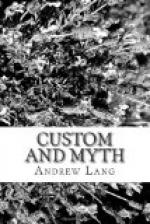This is a universal note of primitive poetry, and is not a peculiar Finnish idiom, as M. Leouzon le Duc supposes; nor, as Mr. Tozer seems to think, in his account of Romaic ballads, a trace of Oriental influence among the modern Greeks. It is common to all the ballads of Europe, as M. Ampere has pointed out, and may be observed in the ’Chanson de Roland,’ and in Homer.
While the corn ripened, Wainamoinen rested from his labours, and took the task of Orpheus. ‘He sang,’ says the ‘Kalevala,’ of the origin of things, of the mysteries hidden from babes, that none may attain to in this sad life, in the hours of these perishable days. The fame of the Runoia’s singing excited jealousy in the breast of one of the men around him, of whose origin the ‘Kalevala’ gives no account. This man, Joukahainen, provoked him to a trial of song, boasting, like Empedocles, or like one of the old Celtic bards, that he had been all things. ’When the earth was made I was there; when space was unrolled I launched the sun on his way.’ Then was Wainamoinen wroth, and by the force of his enchantment he rooted Joukahainen to the ground, and suffered him not to go free without promising him the hand of his sister Aino. The mother was delighted; but the girl wept that she must now cover her long locks, her curls, her glory, and be the wife of ’the old imperturbable Wainamoinen.’ It is in vain that her mother offers her dainty food and rich dresses; she flees from home, and wanders till she meets three maidens bathing, and joins them, and is drowned, singing a sad song: ’Ah, never may my sister come to bathe in the sea-water, for the drops of the sea are the drops of my blood.’ This wild idea occurs in the Romaic ballad, [Greek], where a drop of blood on the lips of the drowned girl tinges all the waters of the world. To return to the fate of Aino. A swift hare runs (as in the Zulu legend of the Origin of Death) with the tale of sorrow to the maiden’s mother, and from the mother’s tears flow rivers of water, and therein are isles with golden hills where golden birds make melody. As for the old, the imperturbable Runoia, he loses his claim to the latter title, he is filled with sorrow, and searches through all the elements for his lost bride. At length he catches a fish which is unknown to him, who, like Atlas, ’knew the depths of all the seas.’ The strange fish slips from his hands, a ’tress of hair, of drowned maiden’s hair,’ floats for a moment on the foam, and too late he recognises that ’there was never salmon yet that shone so fair, above the nets at sea.’ His lost bride has been within his reach, and now is doubly lost to him. Suddenly the waves are cloven asunder, and the mother of Nature and of Wainamoinen appears, to comfort her son, like Thetis from the deep. She bids him go and seek, in the land of Pohjola, a bride alien to his race. After many a wild adventure, Wainamoinen reaches Pohjola and is kindly entreated by Loutri, the mother of the maiden of the land. But he grows homesick, and complains, almost in Dante’s words, of the bitter bread of exile. Loutri will only grant him her daughter’s hand on condition that he gives her a sampo. A sampo is a mysterious engine that grinds meal, salt, and money. In fact, it is the mill in the well-known fairy tale, ‘Why the Sea is Salt.’ {169}




